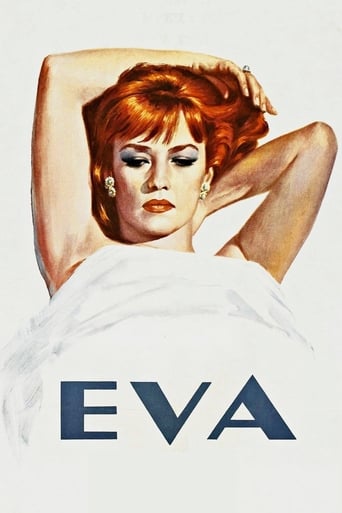writers_reign
The Pseuds are gonna be falling over themselves to rave about this piece of cheese followed closely by the Academics lining up to 'teach' it. Good luck to both camps. Basically it's a pseudo-intellectual 'director' wallowing in self-indulgence, seemingly willfully - certainly knowingly - miscasting two incompatible leads and seeking in the to temper this by setting the action in an out-of-season Venice and more or less ignoring the 'tourist-picture-postcard elements in favour of a cryptic and virtually meaningless storyline involving two unsympathetic leading characters in the shape of a fraudulent novelist and - we have to take their word for this - an irresistible woman, who is, in fact, as irresistible as a three a.m. rap on the door by the Gestapo. Stanley Baker and Jeanne Moreau don't even try to do anything with this drek and it's yawns all round.
Waerdnotte
A French Italian co-production; here we have Losey attempting to create a Felliniesque European Art House movie with hints of Nouveau Vague. Losey uses Jeanne Moreau to sell what is a concoction of 1950s and 60s art house clichés where character and story development are virtually non-existent. Nothing made me want to engage with the movie, and after an hour I just had to give up. Stanley Baker is appallingly cast as the leading man, the script is dreadfully wooden, and the unremitting jazz score does not hide the fact that this series of clichés just does not work as a film. If this is interesting only for film studies students, then maybe the people writing the courses should seriously ask themselves why - Losey made many better movies and the European Art House scene of the 50s and 60s has far better examples of ground breaking cinema. A great big pretentious yawn of a film that should have been strangled at birth.
emuir-1
This film is oh so 60's that it is as much a time capsule as La Dolce Vita. The clothes, hair styles, make up, and attitudes all date this film. Even the furnishings scream `period piece'.If you don't mind spending good money watching Jeanne Moreau strike one pose after another while wearing heavy eyeliner and false eyelashes, then this is for you. If there was a story I missed it although the theme did seem to be half decent man ruined by infatuation with femme fatale. The action takes place in Venice in the winter - no tourists, no pigeons and very bleak. As far I could tell the action comprised Ms. Moreau strutting into a room with her hair done up trailing her fur coat behind her, lighting a cigarette, turning around blowing smoke and we see her face in close up. This scene is repeated throughout with a variation when she unpins her hair and shakes it loose, or brushes it. She also lights up before going to bed at night after hugging the cat , or maybe she lit up before hugging the cat. Maybe she gave the cat a smoke too. Stanley Baker was the man who became besotted by her although if I got it right, she despised him. Virna Lisi was his sweet little betrayed wife. Jeanne Moreau, cigarette dangling from the corner of her mouth, posed in various couture gowns in a casino, night club, parties and smoked heavily throughout. Until the film ended.
davidholmesfr
Filmed in noir et blanc this is more noir than blanc. `Film gris' might be a better category. Venice in the winter with stormy waters, in more ways than one, provides the backdrop to this tale of two strong characters, Eve (Moreau) and Tyvian Jones (Baker). Neither character deserves, or gets, a shred of sympathy from us, she being a ruthless gold digger and the personification of evil, he a womanising writer who takes plagiarism to new heights (or depths).Despite this, the powerful interaction between them draws us in to their world as their doomed relationship develops. This development is far from straightforward, as one would expect with Losey directing a French/Italian production. Both main characters appear deaf to each other's needs or demands. The film starts more or less where it finishes but we do not get taken around a clear circle, rather we fly off at irregular tangents. Whilst not making for easy viewing it does, nevertheless, hold our attention.
Moreau is central and dominates every scene in which she appears. In truth when she's not on screen the film falls rather flat. I'm not convinced that casting Baker, whose expertise lay in hard man roles either military (`Zulu') or criminal (`Robbery'), was right. He just about got away with it as a university don in Losey's later film `Accident', but as a writer moving in artistic circles this may be a stretch too far. If a freebooting Welsh Lothario (in Dylan Thomas mode) was required just think what Richard Burton might have made of it!Watch out for a brief, but wonderful performance by James Villiers as a lugubrious, plummy screenplay writer. This is not a film for recalling the `funny bits' but I defy British viewers not to enjoy Moreau's last words in the whole film - `Bloody Welshman'. Not a term unheard in English, Scottish or Irish rugby circles – but coming from Jeanne Moreau? Hilarious and wonderful.The film is probably about 15 minutes too long – some of the scenes between the two main characters have elements of repetition and add little to the overall development. An interesting, if flawed, movie.



